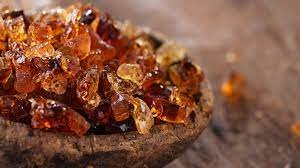Gum Arabic as major export earner: Prospects and challenges
By Doris Esa, News Agency of Nigeria (NAN)
Gum Arabic is the natural gum exuded by various species of the acacia tree. It is a perennial tree that grows wild in large commercial quantity in the northern parts of Nigeria.
The gum is a unique multi-functional food additive used to enhance flavour in confectioneries as well as emulsifier, stabiliser and clouding agent in beer and soft drinks, in pharmaceuticals.

It is used as stabiliser for emulsions and as blinder and coating for tablets. In cosmetics, it is used as adhesive or facial masks and powder to give feel to lotions, textile, plants and lithographic industry.
Nigeria is the largest producer of Gum Arabic in West Africa, and third largest world producer and exporter after Sudan and Chad.
The major producing states included Borno, Yobe, Jigawa, Bauchi, Adamawa, Kebbi, Gombe, Plateau, Katsina and Zamfara.
Though, the crop contributes over 60 per cent of the total export volume, in spite of this, in recent years there has been a decline in the production of the commodity in the country.
The global revenue to be generated from its production and industrialisation would reach 476.1million dollars by 2025 forecasts Raw Materials Research and Development Council, Nigeria’s research and development agency.
Nigeria, being the largest producer of gum Arabic in West Africa, stakeholders say not processing the commodity locally before exporting is causing Nigeria huge losses in form of revenue and employment opportunities.
According to gum Arabic stakeholders, the major problems militating against optimal production and processing of Gum Arabic in Nigeria include; low market margin and efficiency of production.
Others they said was lack of processing facilities, adulteration of grades which results to poor domestic and international prices as well as poor marketing information.
Other challenges are; inadequate finance and transportation problems as most rural markets are either not motorable or were in bad conditions.
To address these challenges, the Federal Ministry of Agriculture and Rural Development, organised a stakeholders meeting to brainstorm on how gum Arabic be more viable and accelerate its contribution to the nation’s economy.
They identified factors such as quality inconsistency and production disruptions due to insurgency as major sources of concern.
Speaking at the event, a former Minister of State for Agriculture and Rural Development, Mustapha Shehuri, said that the meeting was timely as Nigeria is diversifying her economy from dependence on oil economy to an Agricultural Green Alternative Agenda.
He said that the gum Arabic has the potential to act as shelter belt, thereby reducing the problems of desert encroachment, environmental degradation and poor soul nutrition.
Shehuri said the natural gum also has potential to reduce issues of environmental zones, particularly in the Sudan-Sahellian ecological zones which are around the North East and North West parts of the country.
Read Also: Education: Stakeholders seek govt.’s intervention to reduce mass…
Shehuri said the decline in the production of gum Arabic is an after effect of the insurgency in the states where it is being grown and produced.
“Distinguished audience, gum Arabic production is on a decline mainly due to insurgency in its area of production.
“As at today, Nigeria is the 5th world producer instead of the 2nd largest producer, which it was previously after Sudan.
“Not processing the commodity locally before exporting is causing Nigeria huge losses in form of revenue and employment opportunities,” he said.
Shehuri said that Agriculture must be treated with the seriousness it deserves due to its enormous potential.
He said that these potential included; the economic diversification, job creation as well as foreign exchange earnings from export of special Agricultural products such as Gum Arabic.
Chief Chidume Okoro, the President, National Association of Gum Arabic Producers, Processors and Exporters of Nigeria (NAGAPPEN), said Nigeria needed to rally both locally and international in the production of Gum Arabic.
“We need to plant a minimum of 4 million seedlings of Gum Arabic every year that will produce at the end of 10years about 11,000 metrics tonnes of Gum Arabic.
“Nigeria has the potential to produce 40,000 metric tonnes of Gum Arabic every year,” Okoro said.
He, however, expressed regrets that the potential has dwindled due to the insurgency, farmers – herders clashes and banditry ravaging the North – East and North – West parts of the country.
Mrs Binta Mukhtar, the Chief Executive Officer, Rahma Agro Processing Park, urged the government to facilitate soft loans for those who plan produce, process and export Gum Arabic.
Stakeholders urge the federal government to address the challenges impeding the country’ s performance in the production of gum Arabic for the nation to tap from its global market.
They say Nigeria should leverage its huge gum Arabic potential to enhance foreign exchange earnings.
They say for that to be possible, more investment should be made by both public and the private sectors towards researches into gum Arabic production and marketing.

